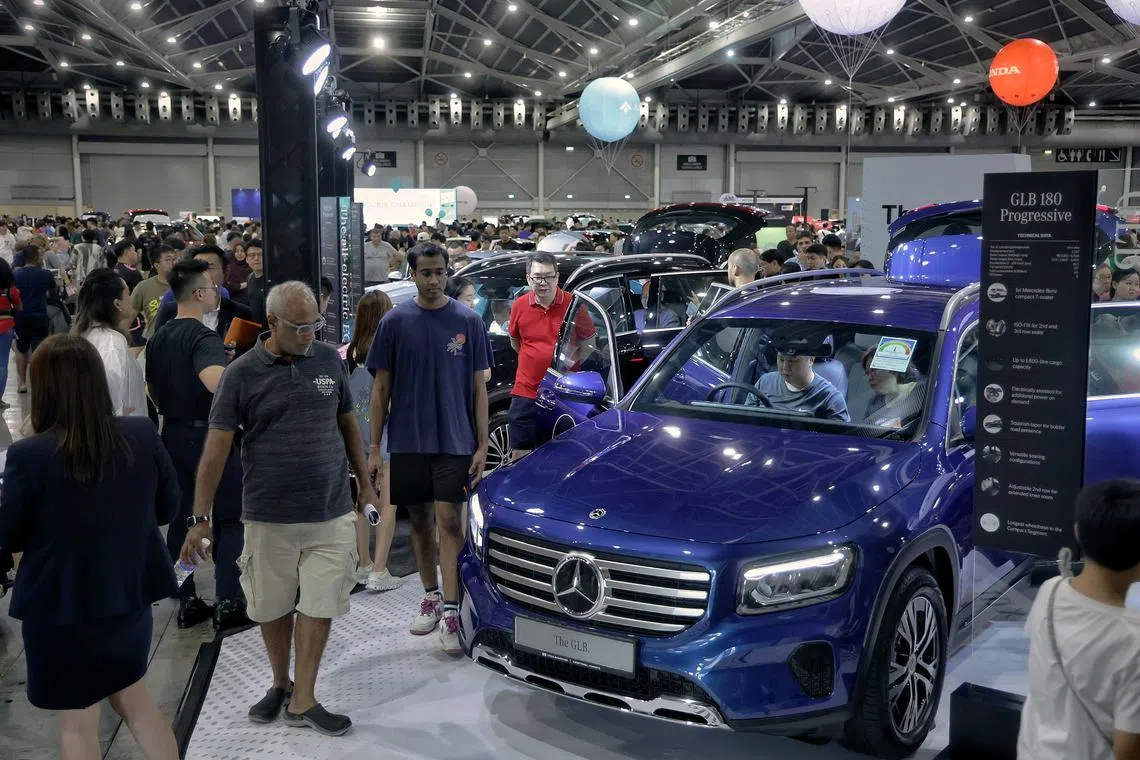Retail sales in Singapore up 2% in September, boosted by motor vehicle sales
Sign up now: Get ST's newsletters delivered to your inbox

The sharp rise in motor vehicle sales was aided by increased certificate of entitlement quotas and increased demand for electric vehicles.
ST PHOTO: KEVIN LIM
SINGAPORE – Retail sales here went up in September, largely driven by motor vehicle sales, which saw a sharp rise aided by increased certificate of entitlement quotas and increased demand for electric vehicles.
Takings at the till increased by 2 per cent in September from a year ago, following the 0.7 per cent growth in August, data from the Department of Statistics showed on Nov 5.
Excluding motor vehicles, retail sales decreased by 1.4 per cent, extending the 1.3 per cent drop in August. Six of the 14 categories saw a rise in sales.
On a seasonally adjusted basis, retail sales rose by 0.4 per cent in September over the previous month.
The biggest year-on-year rise was for motor vehicles (29.6 per cent). Other industries that saw a rise in sales include cosmetics, toiletries and medical goods (2.9 per cent), and furniture and household equipment (2 per cent).
Sales dropped year on year in other sectors, with the largest declines observed in petrol service stations (9 per cent) as well as apparel and footwear (9.3 per cent).
Sales of discretionary items like apparel and footwear continued to decline as the strong Singapore dollar likely gave locals the incentive to divert their spending and purchase such goods when they travel abroad, said DBS Bank economist Chua Han Teng.
The estimated total retail sales value in September came in at $4 billion.
Of this amount, about 13.8 per cent was from online sales, higher than the 12.2 per cent recorded in August.
Excluding motor vehicles, total retail takings were about $3.4 billion, of which 16.2 per cent came from online sales.
Major sporting events, popular concerts, business travel, and meetings, incentives, conventions and exhibitions could support retail sales, while disbursement of the Government’s cash handouts – such as under the Assurance Package in December – will be an additional boost for consumers, said UOB economist Jester Koh.
Mr Koh added that while discretionary spending could pick up in the upcoming festive season, the impact on retail sales could be limited by some diversion of resident spending abroad during the school holidays and spurred by the still-strong Singapore dollar.
Sales of food and beverage services increased by 1.6 per cent year on year in September, extending the 4.4 per cent growth in August.
The total sales value of food and beverage services was estimated at $978 million, with about 23.9 per cent from online sales, compared with the 24.1 per cent recorded in August.
The revenue of food caterers rose by 19.1 per cent, while sales in cafes, foodcourts and other eating places rose by 2.4 per cent.
On the other hand, sales at restaurants fell by 1 per cent.
Takings at fast-food outlets fell 4.1 per cent.
The performance of the retail sector is dependent on the domestic labour market and the strength of the tourist dollar, said OCBC Bank chief economist Selena Ling.
Said Ms Ling: “The Ministry of Manpower’s (MOM) forward-looking polls for September indicate a decline in hiring and wage expectations as the number of firms reporting an intention to hire fell to 43.2 per cent from 49.4 per cent in the second quarter of 2024.”
MOM expects employment to continue expanding in the fourth quarter of 2024, supported by strong growth and increased year-end hiring for the festive period, said Ms Ling, adding that the fourth quarter of the year should be a relatively resilient period for retail sales, given the upcoming festive season.


